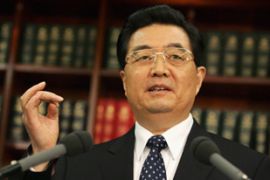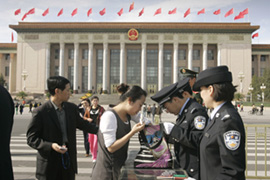Shanghai boss expelled from party
Expulsion over corruption scandal sets tone for key communist party congress.

Published On 13 Oct 2007
Hu has frequently warned that corruption and abuse of power is the biggest challenge facing the communist party and the greatest threat to its continued grip on power.
In July the country’s former food and drug regulator was executed for taking millions of dollars in bribes to approve substandard medicines.
‘Tough battle’
In a statement on Chen’s case, the Central Commission for Discipline Inspection – the communist party’s top investigative body – described tackling corruption as “a long-term, complicated and tough battle”.
 |
| Security has been tightened ahead of the meeting [AFP] |
Chen, who is in detention awaiting trial, was sacked from his post last year after he was linked to the theft of about $500 million from Shanghai’s social security fund.
He was the highest ranking Chinese official to be dismissed in a decade, and his final removal from the party is being seen as a sign that communist leaders intend to make an example of him.
Hu and other top party officials had already agreed in principle to revoke Chen’s party membership, branding him “morally decadent” and a “philanderer”.
Aside from the corruption case, Chen also angered the president for deliberately overruling measures aimed at cooling China’s breakneck economic growth.
His final fall from grace is seen as a warning to other cadres to toe the line set by Hu.
Some of the 20 other officials and businessmen connected to the scandal have already been given life terms in jail and Chen’s long-awaited criminal trial is now expected to get the go-ahead.
Threat
Chen’s removal from the party came as a report from a US-based think tank warned that corruption among Chinese officials had jumped “exponentially” in recent years.
The report, compiled by the Carnegie Endowment for International Peace, said corruption was costing China more every year than it spends on education and represented the biggest threat to its future political stability.
It said the situation was made possible because of lax law enforcement and the fact that, despite decades of economic reform, the state remains extensively involved in the economy.
Another factor it said, despite increasingly tough warnings from the top leadership, was the communist party’s reluctance to adopt reforms.
The report may make worrying reading for Hu and other senior Chinese leaders, but is unlikely to contain anything they do not already know.
Minxin Pei, the study’s author, calculated that about 10 per cent of government spending is taken up by kickbacks, bribes, or is simply stolen.
“Corruption has not yet derailed China’s economic rise, sparked a social revolution or deterred Western investors,” said Pei.
“But it would be foolish to conclude that the Chinese system has an infinite capacity to absorb the mounting costs of corruption.”
Source: Al Jazeera